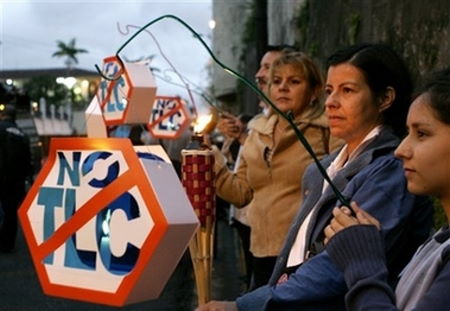TISA and TPP: trade unions and social movements resist unfair trade deals

Karibu Foundation: Voices from the South | September 2015
TISA and TPP: trade unions and social movements resist unfair trade deals
by Oscar Rodríguez
Over 20 years have passed since the signing of two major free trade agreements in the Americas (NAFTA and CAFTA-DR), without signees like Mexico, Central America and the Dominican Republic being able to tangibly witness positive advantages as a result of them. On the contrary, the negative effects brought by these agreements have exposed an increasingly unequal trade relationship due to existing inequalities established by the rules of the international free-trade game.
In addition to the already fragile condition of the economies of these countries, the impacts of a new international economic context are starting to be felt in the region. This not only affects exports, stalls economic growth, and depletes social investment; it also clears the way for new free trade agreements that weaken the sovereignty of these countries and removes labor rights and social protections for its citizens.
There are two mega agreements that are being negotiated that fit into this scenario in our region: the TPP (Transpacific Partnership Agreement) and the TISA (Trade in Services Agreement). Both of these agreements are yet another tool to enhance the expansion of a free trade model that is notoriously voracious and perverse, and both are aimed at subduing countries by undermining their sovereignty and threatening their natural resources.
These global trade enslavements do not aim to privilege the common good and wellbeing as a factor for human development. On the contrary, they represent and work for the economic satisfaction of the few.
The people have therefore begun to raise their voices against these two new trade agreements, and are working for a broad and inclusive social agreement with workers, citizens, social movements and network representatives against this type of harmful global business deals.
Joint efforts are also being initiated by trade unions, social networks and MPs across the region to stop these agreements. Since Mexico joined TPP negotiations in 2012, for example, several social and labor organizations in the country have expressed their opposition to it. They lift up the following points as some of the fundamental concerns with the negotiations:
– the negotiations have taken place in secrecy, with no possibility for unions and social organizations to ensure their participation.
- the negotiations include a broader range of issues than those of previous agreements, covering aspects such as financial services, intellectual property rights, and the establishment of a supranational police oversight of the Internet.
- in Mexico, the beneficiaries of the agreement are mainly 500 companies that concentrate 70% of the manufacturing exports in the country.
- in 2014, Mexico recorded a total trade deficit with Asian countries amounting to nearly US$ 110 billion dollars. The TPP will worsen this trade deficit, and will in fact exacerbate the loss of jobs for Mexican workers.
- Human rights and labor rights continue to be violated in Mexico. Environmental protection remains weak, and the impacts of climate change have begun to damage the economy of the country. Mexico is therefore already at a disadvantage vis-à-vis many other TPP countries.
A similar situation is brewing up in the region related to the TISA negotiations. Despite the calls for transparency by civil servants and trade unions towards federal governments, the TISA negotiations continue in absolute secrecy.
The people have therefore begun to raise their voices in opposition to TISA, and this has led to results. After pressure from a strong coalition of trade unions, environmentalists and farmers who among other things organized a general strike on the issue, Uruguayan president Dr. Tabaré Vázquez announced in September 2015 that he would listen to public opinion and end Uruguay’s involvement in the secret TISA negotiations. Paraguay will now likely end their negotiations in the next round as well.
There is also movement against the TISA in other Central and South American countries. In Costa Rica, a broad sector of the social and trade union movement in the country signed a social and political pact in front of more than one thousand people with representatives of two of the main left-wing parliamentary forces, committing to struggle against the TISA and unfair free trade, among other things. In Mexico, national training workshops on TISA have been coordinated by Our World Is Not for Sale (OWINFS) and the Friedrich Ebert Stiftung, with similar trainings planned for Panama, Colombia and Peru in the months ahead.
Outside of the region, the World Trade Organization (WTO) will be holding its Ministerial Conference in Nairobi, Kenya in December 2015. Given the difficulties so far in the WTO to establish a clear roadmap to ensure substantive progress in Nairobi, it is unclear if issues raised in the TPP and TISA (which are negotiated outside of the WTO’s oversight) will be brought to the negotiation table at all. Yet social movements from around the world will, in any scenario, be watching closely in Nairobi in order to be alerted of any overlap in these processes that are all aimed at expanding the global free trade regime.





